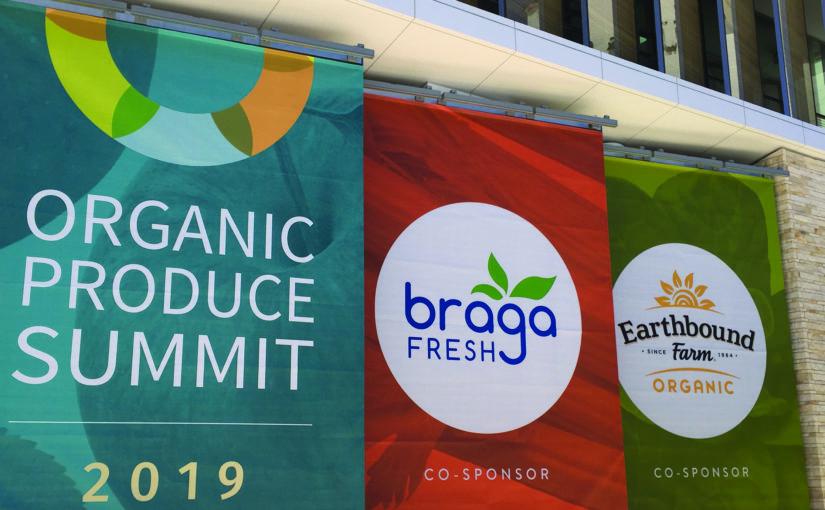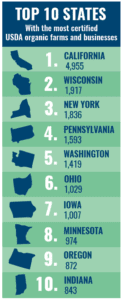
Sep 30, 2019Organic growth in the spotlight
The organic industry is on an upward path, a movement that was on full display at the 2019 Organic Produce Summit.
The fourth annual event, held in July in Monterey, California, attracted more than 1,600 attendees. The trade show floor had 148 exhibitors, and organizers said the event brought in 260 retailers.
The pre-conference included field tours of Ocean Mist Organic, Driscoll’s, Taylor Farms, Braga Fresh Family Farms, and Tanimura & Antle facilities and operations.
Keynote presentations included author and vice president of RePlant Capital, Robyn O’Brien, and Dan Barber, chef and author of a New York Times best-selling book called “The Third Plate: Field Notes on the Future of Food.” A retail roundtable discussion and other educational workshops also were part of the activities.
The event held in the Monterey Conference Center will return to Monterey next year, organizers said. An Organic Grower Summit will be held this December in the same location.
“We’re just thrilled with the overall response and feedback that we got from retailers and the entire organic community,” said Matt Seely, co-founder of event organizer Organic Produce Network.
In its first four years of existence, the Organic Produce Summit has doubled its attendance and significantly increased both its exhibit space and the number of exhibitors. It also has upped its game with retailer participation and continued offering well-known speakers that bring a connection to the organic produce world.
“The number of the retailers continues to increase each year, but more than that it’s the quality and leadership abilities of those retailers that make a difference,” Seely said. “We strive to provide the best information and education about the growing organic produce category. And with our various networking opportunities, retailers and suppliers tell us we are hitting the mark as an event where business gets done.”
Healthy living motivator

The two keynote presentations stressed the value of organic produce as both speakers described their efforts to create a healthier landscape. Robyn O’Brien, vice president of rePlant Capital, is aggressive in effecting change in agricultural production. Dan Barber, a chef, author and advocate of bringing good farming practices to the table, spoke of his efforts to create better varieties as well as supporting farming practices that bring more “deliciousness” to our plates.
Barber pointed to the importance of the “whole farm” approach to production, which recognizes the role crop rotation and the health of the soil play in the “deliciousness” of food.
He is focused on creating better-tasting food, including the development of Honeynut squash as well as the launching of companies that strives for seed that produces better tasting products. He outlined what he views as a correlation between nutrition and flavor, and is trying to breed for both using old-fashioned breeding methods.
He calls organics “the original disruptor” and said his goal is to “change the world one seed at a time.”
Exploring the value wholesalers can bring to the organic produce space. Greg Kurkjian, vice president and general manager of The Crosset Company, a Midwest wholesaler, said in another session the firm sources from multiple organic growers and can aggregate supplies much more efficiently than a retailer. He talked about Crosset’s increased presence in the organic sector.
“Our core competency is distribution and logistics,” he said.
Elizabeth Nardi, CEO of Organically Grown Company (OGC) of Portland Oregon, said her company matches the needs of organic growers with retailers for 40 years. She said OGC is a “supply chain engineer” such as reimaging an organic purple broccoli that it has introduced to many of its suppliers and retailers.
Working with growers, OGC has been able to extend that season and give its retail and foodservice customers access to the product for a longer period of time.
Mark Hill, director of organic produce for Baldor, a Northeast foodservice distributor based in the Bronx, New York, said chefs seek unique varieties that would be difficult to find on their own. Baldor has created a network of both large and small organic growers that are constantly bringing the wholesaler new items to offer to these innovative chefs.
Growers meet demand
Local organic growers are helped by the wholesalers to produce crops that retailers and chefs want. Kurkjian said Crosset works with state departments of agriculture in the Midwest to identify programs they have to help local growers.
Hill outlined the challenge of keeping West Coast suppliers and local growers satisfied. Baldor’s commitment is to always “get the grower as much money back as possible.”
A constant theme was that organic produce has ongoing growth potential. Nardi said retailers are looking for organic items.
Kurkjian said Midwest consumers are becoming more tuned in to organic produce, including surges of interest in Detroit, Chicago and Atlanta.
Jonathan Steffy, vice president and general manager of Four Seasons Produce, moderated a panel that included Amy McClellan, senior vice president of Indiana-based Martin’s Super Markets; Micah Shea, vice president of sales for Taylor Farms/ Earthbound Farms in the Salinas Valley; and Calvin College, prepared foods manager for the Lexington Co-op, a 14,000-member retail operation in Buffalo, New York. The panel agreed there is a significant opportunity for increased sales of organic meals, but execution at retail is hit or miss.
A survey of 5,000 Martin’s customers who buy organic produce indicated about 45% would be more inclined to buy a meal kit if it was made with organic ingredients. And 55% said they would be willing to pay a premium of as much as 25% for organic meal kits.
McClellan said those results show that there are opportunities to offer an organic meal kit within their stores and increase sales.
College said organic sales and supplies will continue to increase, reducing the costs and showing competitiveness between conventional and organic produce pricing.
Shea talked about Taylor Farms’ newest acquisition, Earthbound Farms. The company offers private-label value-added produce items as well as a large assortment of branded organic salads with the Earthbound Farms label.
The company can create custom products to fit the needs of retailers, helping them to offer prepared meal kits or work with retailers providing value-added items that a retailer can use to create their own meal kits, Shea said.
Retailers tout organics
Three organic produce veterans led another panel discussion on the market benefits of organics.
Tonya Antle, co-founder and executive vice president of the Organic Produce Network, moderated the Retailer Roundtable discussion, which reviewed the opportunities and challenges for the industry. The panel included Greg Corrigan, senior director of produce and floral at Raley’s Supermarkets; Vic Savanello, vice president of produce for The Fresh Market; and Don Barnett, president and chief operating officer of SunBasket.
Raley’s is a leader in organic retailing. In some Raley’s stores, organic produce accounts for more than 30% of produce sales.
The Sacramento, California-based retailer handles about 260 organic produce items. Corrigan pointed to the rise in online sales as the company develops its “click and collect” internet platform. He called technology a “game changer” that is making the company more efficient, as it can better forecast the chain’s needs and create a better replenishment system.
Corrigan said the organics market has not plateaued and will continue to grow. He said the supply chain for the sector is improving, which will boost sales.
“The demand is going to continue to grow,” Corrigan said. “You are seeing all the mainstream suppliers, that never used to handle organics, now growing organic; so you’re going to see that supply chain get better, and you’re going to see retailers continue to grow the business.”
Savanello said The Fresh Market is designed to compete alongside internet sales of food.
Barnett’s SunBasket sells meal kits to consumers online, with organic farming practices as one of SunBasket’s brand pillars. He described SunBasket’s three distribution centers strategically located throughout the country, giving the firm the ability to bring organic food options to 99% of the ZIP codes and introduce that produce item to consumers who have access in no other way.
– Gary Pullano, managing editor
















